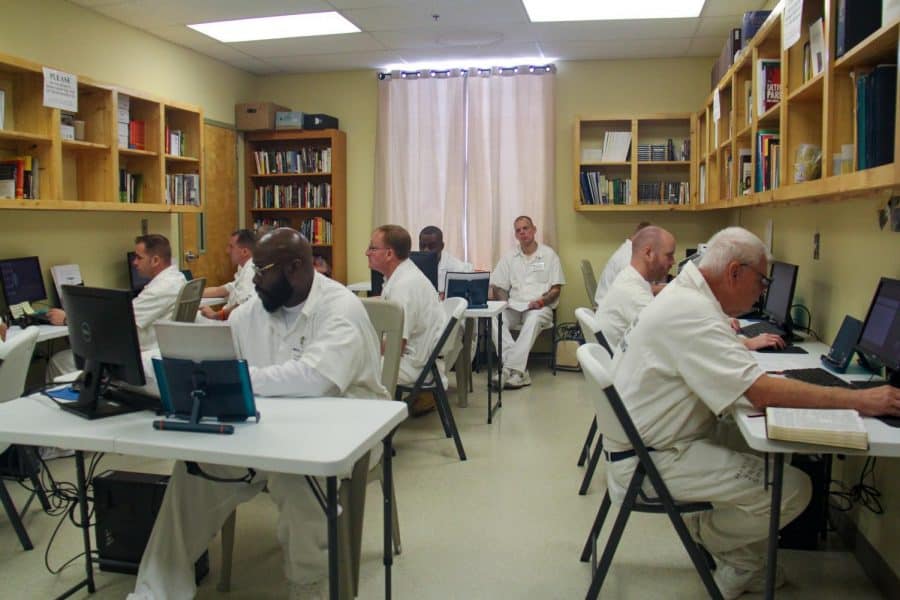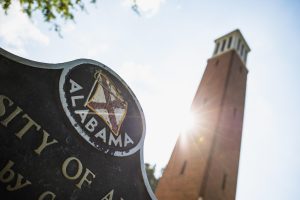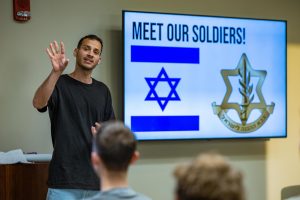West Alabama inmates find rehabilitation in prison ministry
October 10, 2019
Two inmates at Bibb Correctional Facility in Brent, Alabama, speak about how they rely on prison ministry programs for hope and purpose.
Bibb Correctional Facility, with its large, low, sheet-metal buildings, isn’t too far removed from the young rural churches that dot the countryside between Tuscaloosa and Brent, Alabama. But any confusion is dispelled by Bibb’s multilayered fences and gleaming rows of barbed wire.
The inmates at Bibb are designated as medium security risks, convicted of crimes that range from drug possession to robbery. There have been 130 assaults and 122 fights in the prison from the start of the fiscal year to June.
Bibb is just one of many prisons in Alabama that suffer from a lack of funding and overcrowding. The population was at 196% over designed capacity when data was last released. This is the environment in which prison ministries work.
“We need role models,” chaplain Bysheen Tomlin said. “I tell volunteers they have to be role models. It’s beyond preaching … We don’t need preachers in this space. We need people to go to the dorms and teach, model good behavior, tell [inmates] how they made it.”
Tomlin is the only chaplain for the 1,803 inmates at Bibb. He oversees religious programs with a team of inmates and volunteers. Most programs at the facility, religious or otherwise, are run by volunteers, he said.
“These [inmates] have skills, and I’m always trying to get them to redirect those skills,” Tomlin said. “They could be car salesmen, realtors, they’re great mathematicians, artists … Some of them are working around this facility on maintenance teams.”
The bond formed by the inmates’ ministry is essential to their time in prison, Tomlin said. Healthy friendships are rare, and the ability to be vulnerable is rarer still.
“I think [ministry fellowship] helps ease them through the process of doing 10 or 15 years,” he said. “[Inmates] become brothers.”
Marcellus, an inmate at Bibb, was agnostic before prison. His prior attitudes toward life were materialistic and prideful, he said.
“The chaplain here, the services and the ministries bring me more in tune with God,” Marcellus said. “[We had] free-world guys coming here and pouring out into us when I didn’t understand what love really was.”
Marcellus is now a part of a jumpstart ministry, a year-long discipleship program that is part of Bibb’s pro-social facility.
Inmates apply to be in this separate living community where they have more privileges and freedoms. They must pass the application process and comply with strict behavioral rules. This program is thought to help inmates develop healthy social behaviors and then practice those behaviors in a tight-knit community.
“Having these relationships with people is what I really needed in my life because I thought I was alone and doing well,” Marcellus said. “But together, through prayer and fellowship and community and talking about the Bible, it really helps me focus on what I need to achieve.”
As part of one church’s prison fellowship program, volunteers play softball with the inmates. Marcellus’s eyes lit up as he talked about the fun they have in those games.
“It’s therapeutic knowing that people can come out and not judge us [for what we did],” Marcellus said.
Now, Marcellus hopes he can spread his message to other inmates. Newer people are less receptive, he and Tomlin said.
“Any negativity [from other inmates] reminds me that it’s these guys who need Christ the most,” Marcellus said. “I see God working in this place, and I can’t say he’s transforming it completely, but one by one.”
Marcellus intends to come back as a ministry volunteer after he is released. He believes that by his example, he could help inmates who are struggling.
University of Alabama senior Jackson Wewers volunteers in a business literacy program at Bibb. As an accounting major, Wewers began volunteering through a class in the Culverhouse College of Business, but he continued his involvement because of his faith.
“I’m a Christian … If I believe in redemption, I should want to see people change their lives for the better,” Wewers said.
Wewers believes practical education programs like his are necessary companions to spiritual ministries in a prison.
“Spiritual redemption that doesn’t equip people [practically] leaves them stuck where they are,” Wewers said. “Through practical help, these business skills can keep [inmates] from returning.”
Samuel, another inmate at Bibb, grew up religious. Though his mother was “prayed-up,” his faith wavered at times, he said. Samuel was incarcerated once before his present term.
“There were times in my life when I was going through things and I had nothing to turn to,” Samuel said. “I was losing hold of some of the morals I had growing up.”
Samuel was renewed in his faith after going to prison. Now, he takes GED classes at Bibb and volunteers in one of the programs there. Inmates need anything they can get in the way of programs, Samuel said.
“Inside of here, there are always individuals seeking something,” Samuel said. “And [these events] can give you a sense of peace, a sense of direction, someone that you can turn to.”
However, volunteer ministries could be more effective in addressing the struggles of inmates, Samuel said.
“A lot of issues that are going on in prison fall outside of what the Bible explicitly says,” Samuel said. “The Bible gives you a direction to deal with problems … But issues could be addressed more [directly] in ministries.”
Samuel suggested that volunteers sit down and listen to inmates before designing programs. Finding out what they are going through is essential to providing effective programming. He believes that this understanding is essential to helping inmates and at-risk young men.
“[I want to] be somebody that can guide and direct these young individuals that may be falling upon the path that I once traveled, give them some kind of guidance that would have substance,” Samuel said.





















